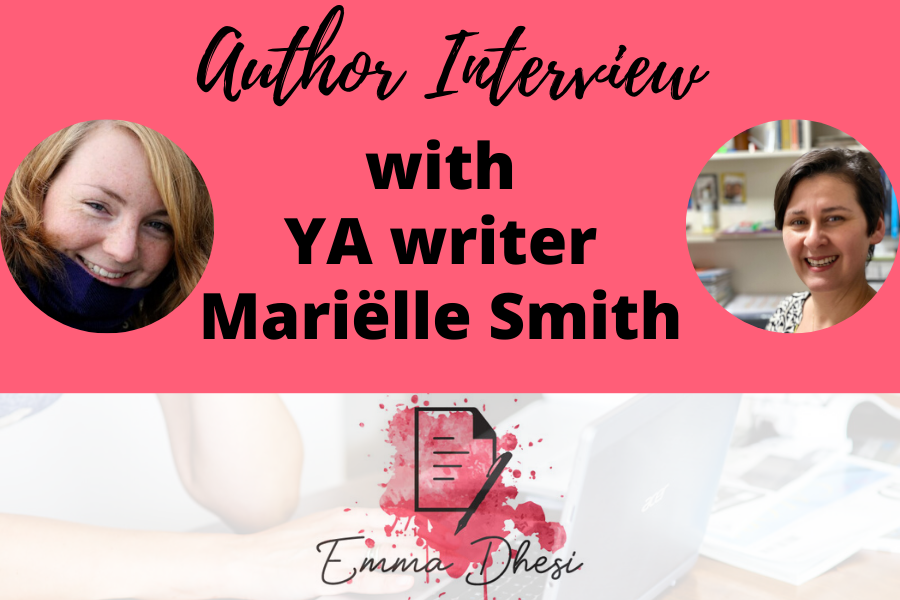Who is YA writer Mariëlle Smith?
I first came across Mariëlle Smith when I was looking for someone to help me re-write the blurb for my first. I so enjoyed working with her that we kept in touch. I’ve since joined her Facebook Group The Accountable Wordsmith and am booked in again to use her wordsmithing skills for my next novel.
I have since discovered Mariëlle Smith has many more bows to her arrow and she shares some of her insights with me in this interview we conducted a few weeks ago. I know she will inspire you in your own writing life.
How did you start writing? Did you write as a child, or did you come to it later in life?
I’ve written for as long as I can remember. Stories, cartoons, diaries, poems, song lyrics, all of it. But it was always a hidden hobby until I turned twenty-six. That’s when I let a writer friend read my work in progress and she convinced me to start taking it seriously.
You come from a Scots/Dutch background, do you prefer writing in English or Dutch?
English. Somehow, I find it difficult to express myself creatively in Dutch. I’m currently translating some of my books to Dutch and it’s hard. There’s so much resistance. It just doesn’t flow for me the way English does. Officially, Dutch is my mother tongue, but it never felt like it was.

From time to time, I link to products or services I love using with affiliate links. This means that I may receive a small percentage or fee for referring you to any product you may purchase from one of those sites. It does not cost you anything. These small fees help sustain my small business. I truly appreciate your support.
Not only are you Editor-In-Chief of the bilingual journal Tijdschrift voor Genderstudies (Journal of Gender Studies) but you offer editing and coaching services to writers. Added to this, you are writing a novel. How do you balance these different roles?
Pretty well, I must say 😉 I’m rather disciplined and my time has become pretty organised over the years. For the longest time, I only was only able to write fiction in the evenings and weekends. Now, I’m so conditioned to that it doesn’t come naturally anymore to do anything else during those hours, except when I have to. Likewise, I find it hard to write fiction on weekdays during office hours, because those still feel like ‘work hours’ to me, even though I quit my day job as a university teacher over a year ago and I could write whenever I want to.
What are your objectives for each writing session – to write a set number of words, write for a set period of time, as the muse takes you?
That depends. I usually want to finish a scene or a chapter, but when I get really stuck, I switch to periods of time and tell myself it’s all good, I just have to get that hour in, or that first 20-minute writing sprint. Focusing on the minutes instead of the words for a while stops me from being too hard on myself, because I did write. I did do something to bring my writing career forwards, no matter how small.
Do you plot or pant your stories?
I plot but not in a rigid way, I would say. I have a bullet point list of all the things that need to happen in this scene or that chapter, but I don’t always know how those story elements will go together until I’m writing and my characters surprise me by saying or doing the perfect thing to combine some of those common threads.
I know a lot of pantsers are terrified plotting will take away all the fun, but my story surprises me every time I open Scrivener because I only know that this and this and that need to happen or has to be mentioned. I’m not sure of the how yet when I put my fingers on the keyboard.
Which writers inspire you?
Elizabeth Gilbert for who she is and how she deals with life and creativity (I’m pretty sure she’d say life is creativity).
I admire Cassandra Clare for her world-building skills and the way she brings diversity to the table. The same goes for Clare Sager.
My indie writer friends inspire me every day. Their resilience, tenacity, the way they support each other and lift each other up. It’s a brilliant family to be part of.
Are there any craft books you’d recommend to beginner writers?
Stephen King’s On Writing changed my life. It kicked most of my imposter syndrome straight to the kerb.
A lot of beginner writers are scared of not being good enough. Did you ever worry about this?
Of course, I think we all do. I’m still waiting for people to find out that nothing I write has actual value. I think it gets to all of us, no matter where we are in our careers or how many books we sell. The trick is to build enough confidence you can keep it at bay for the most part and know how to get out of those thought patterns once they start eating at you again.
There’s this one quote from Steven Pressfield’s The War of Art I saved a long time ago, finding myself hoping that he was right. I still hope he is because it’s one of those questions I keep asking myself:
‘If you find yourself asking yourself (and your friends), “Am I really a writer? Am I really an artist?” chances are you are. The counterfeit innovator is wildly self-confident. The real one is scared to death.’
I’m a strong believer that there’s an audience for every writer. Would you agree with that?
Yes, absolutely. That’s why I’m rather sceptical about the concept ‘writing to market’. Not that you shouldn’t consider the market at all when you’re writing, but I would always suggest starting from what you want to write and then see whether there’s anything similar out there and what those books are doing. If you can work with that, great!
That said, even if there’s a book inside of you that needs to come out but there’s nothing similar out there yet, you should still write it. Somewhere, some reader might be waiting for the genre that you are about to create. Likewise, somewhere, some authors might be waiting for your book too, because they don’t have your courage at the moment and your book will give them permission to finally write what they have been wanting to write for so long.

Where do you get your story ideas?
I don’t know. They just come to me. I might be seeing or hearing or reading something, anything, and then a whole world opens up inside my head. As soon as I quiet my mind—which can happen during walks, gardening, in the shower, driving, doing the dishes—something will show up. Which isn’t always convenient, as I’m sure you can imagine.
What has helped me in the past as when stuck on some scene was listening to music. Just putting a random album on might give you a brilliant idea for what your character’s mood is at the time or what they could say or want.
What is your current novel about?
Right now, I’m working on my YA fantasy project again, after an 18-month hiatus in which I co-wrote and published a romance trilogy under a penname.
The trilogy is about a girl who can’t wait to become part of the witch community again after her parents left that world behind. She’s desperate to no longer stand out amongst the ‘regular’ humans and be bullied for it. However, as soon as she arrives at the capital, her constant failing at doing proper magic keeps drawing unwanted attention and leads her to discover the real reason her parents left all those years ago.
Where can readers find out more about you and the services you offer?
You can find more about me, my books, and the editing and coaching services I offer through my website, my Instagram, or my Facebook page.
If this article was useful, you’ll love:
If you’ve been working on your novel for years (perhaps even decades) the maybe it's time to consider working with a coach.
If you have multiple versions of your novel and you don’t know which works best, are scared nobody will like your book and don't feel like a 'real' writer, then my guess is coaching is the right next step for you.
Find out more and sign up for your free Clarity Call here: https://emmadhesi.com/personal-coaching/

Emma Dhesi writes women’s fiction. She began writing seriously while a stay at home mum with 3 pre-school children.
By changing her mindset, being consistent and developing confidence, Emma has gone from having a collection of handwritten notes to a fully written, edited and published novel.
Having experienced first-hand how writing changes lives, Emma now helps beginner writers find the time and confidence to write their first novel.





